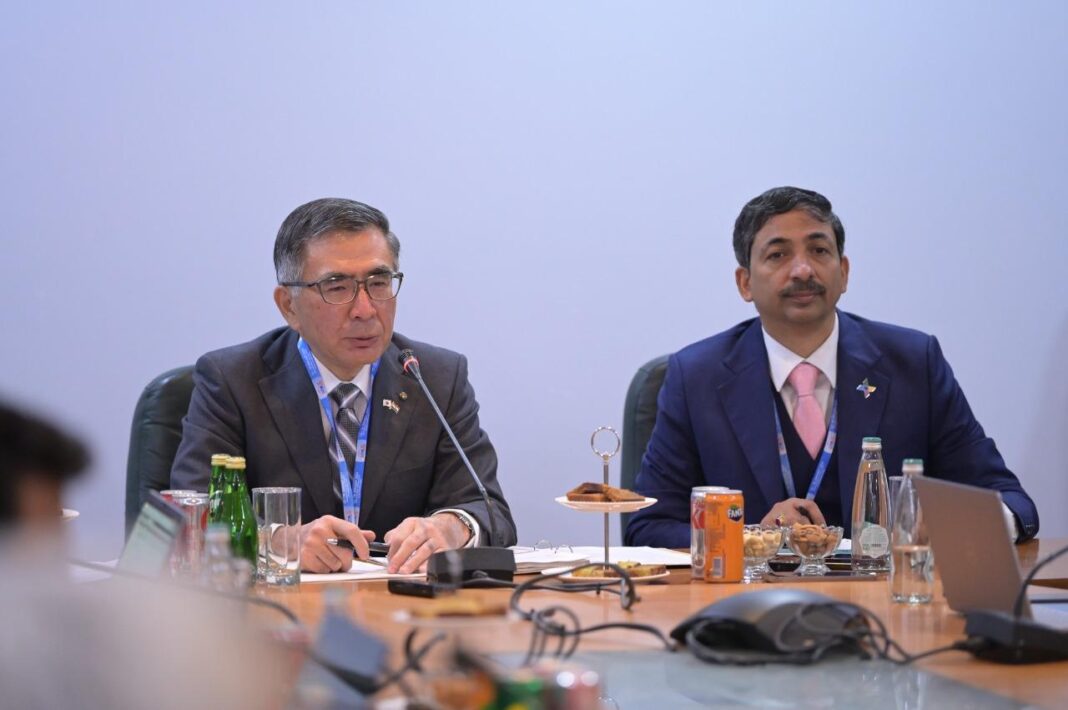[ad_1]
Electric vehicles (EVs) alone cannot help India achieve its net-zero target by 2070 due to the existing “power supply situation”, and the country must tap other options too, Toshihiro Suzuki, representative director and president of Suzuki Motor Corporation (SMC), said on Wednesday.
“Although the global focus is on EVs, if we look at the power supply situation in India, the country must have alternative solutions,” Suzuki said while interacting with journalists at Auto Expo 2023 in Greater Noida. “In order to meet the challenge of making India carbon-neutral, EVs are one of the solutions. Flex fuel, hybrid, ethanol, and hydrogen-driven cars can also be solutions,” he said.
SMC is the majority shareholder in India’s largest carmaker Maruti Suzuki India (MSIL), and 50-60 per cent of its revenues come from the India business.
Net zero means cutting greenhouse gas emissions to as close to zero as possible, with any remaining emissions re-absorbed from the atmosphere, by oceans and forests for instance.
Suzuki said India had the potential to become the top automobile manufacturer in the world, and that small cars (hatchbacks) would have an important role to play in it. In 2022, India beat Japan to become the world’s third-largest automobile manufacturer by producing about 4.25 million units.
MSIL’s share in the Indian car market dropped to 43.38 per cent in 2021-22. “One of the biggest reasons why we could not sustain the 50 per cent market share was the delay in launching SUVs (sport utility vehicles),” he said.
The SUV segment, which has seen the highest growth in the past few years in India, is seeing intense competition among major carmakers. Tata Motors and Mahindra & Mahindra manufactured more utility vehicles than MSIL during the first half of 2022-23.
“If you look at the market share of Maruti in the SUV segment, it is 16-18 per cent. That is one of the biggest reasons behind the decline of Maruti’s market share in India… We are in the process of taking action.
We are trying to recover our market share,” he noted.
Maruti Suzuki unveils eVX
On Day one of Auto Expo 2023, MSIL unveiled the concept electric SUV eVX, powered by a 60kWh battery pack offering up to 550 km of driving range. eVX is likely to be launched in India in 2025.
Suzuki said that while SMC and MSIL were looking to launch electric products in India, they were not depending entirely on EVs for their growth.
He said MSIL’s EV would be “strong and apt” for the Indian market. “India is a huge country, so EVs might do well in some areas, hybrid vehicles in other areas, and there can be regions where CNG might do very well,” he said.
“What kind of infrastructure development is required? What is the best automobile for the users? What will be India’s energy policy? How will the Indian government handle issues related to energy? SMC would like to discuss these issues with the Indian government and develop products accordingly,” he said.
Future of small cars
When asked about the future of hatchbacks in India, Suzuki said only 0.3 billion people out of the total population of 1.4 billion were using cars, so there was “a lot of potential”.
“Carbon-dioxide emissions from small cars are relatively less. We see potential for long-term growth in India for small cars. SMC and MSIL will have to make efforts to ensure deeper penetration of small cars in India,” he said.
He said there could be a time soon when India would be the number one automobile manufacturer. He, however, refused to give any timeline, stating that it was difficult to predict due to factors such as the Russia-Ukraine war, the Covid-19 pandemic and semiconductor shortage. “When I say India can become number one, I mean it from the point of view of potential,” he explained.
On the financial growth outlook for the next financial year, he said: “Although I am not an economist, I feel we are going to pass through a very difficult phase in the next financial year because interest rate policies are changing for every country. Policies are also getting impacted due to the Russia-Ukraine war. There is a big crisis in the energy sector and commodity prices are shooting up due to the war.”
[ad_2]
Source link



